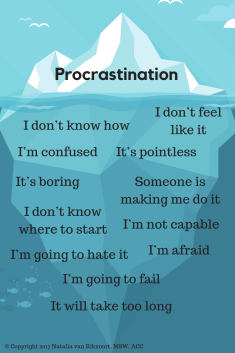Using Self-Awareness to Confront Procrastination
Procrastination is a phenomenon that impacts most of us in one way or another. What do we do when we know we should get started with something, yet keep putting it off? The reasons behind our procrastinating behaviors often go beyond surface level. The iceberg metaphor shows how our emotions and beliefs can complicate our attempts at productivity:

While these deeper motives behind procrastination may make it seem even more complicated, self-awareness can assist in finding ways to achieve your goals. At the root of all anti-procrastination strategies is one question: why am I procrastinating? We can usually recognize that procrastinating is not helping ourselves. Even for those who claim there are positive benefits to their procrastination, some self-reflection may uncover that they still would be better off if they just got started. While procrastination is common, the reasons will not look the same to everyone. Once those reasons are clear, you can start to determine actions to get on the right track. Do any of the following strategies seem useful for you?
- Eat the frog: The “Eat the Frog” strategy says: If you have to eat a frog, it’s probably best to do it first thing in the morning. While you probably weren’t planning on eating any frogs, the idea is to start your day (or study session) with your biggest and most difficult task. Doing the difficult work right away can help alleviate the stress of thinking about how a project will get done.
- Work in shifts: Some may find it difficult to continue to work even after they have gotten started. One way to counter this feeling is to devote specific amounts of time to work on the task. Using a timer to lay out a brief time period for yourself can help you commit to the task at hand. It could be an hour, 25 minutes, or even as short as 5 minutes. From there, you can repeat this process (while mixing in breaks) until the task is complete. You may even be surprised how much gets done in 5 minutes of intentional, focused work.
- Break it up: Procrastination can also occur if the task seems exceptionally difficult or time consuming. Part of finding motivation has to do with your expectations of your ability to complete a task. If you do have one of these tasks that seem daunting, determine the smaller steps that lead to completing the project. A long research paper cannot be completed all at once. Instead, focusing on the steps along the way (gathering resources, creating an outline, drafting each section, etc.) turns the larger task into smaller, manageable pieces.
- Trust yourself as a learner: The process of learning is hard. New concepts and skills do not come to us automatically. If we expect to excel at something that we are still new to, it can be even harder to take that first step. This also applies to learning methods to avoid procrastinating. It often takes some trial and error to determine what works best for you. Be willing to accept where you are and trust the learning process.
As you start to plan your procrastination reduction process, remember that procrastination is a behavior, not a trait. Even if you have had problems with procrastination in the past, and probably will run into challenges again in the future, there are actions you can take to minimize the impact. For help creating an action plan, consider scheduling an academic coaching appointment with the Rutgers Learning Centers!
Image retrieved from: https://www.lotuslifecoachingservices.com/blog/category/addadhd-adults#/


